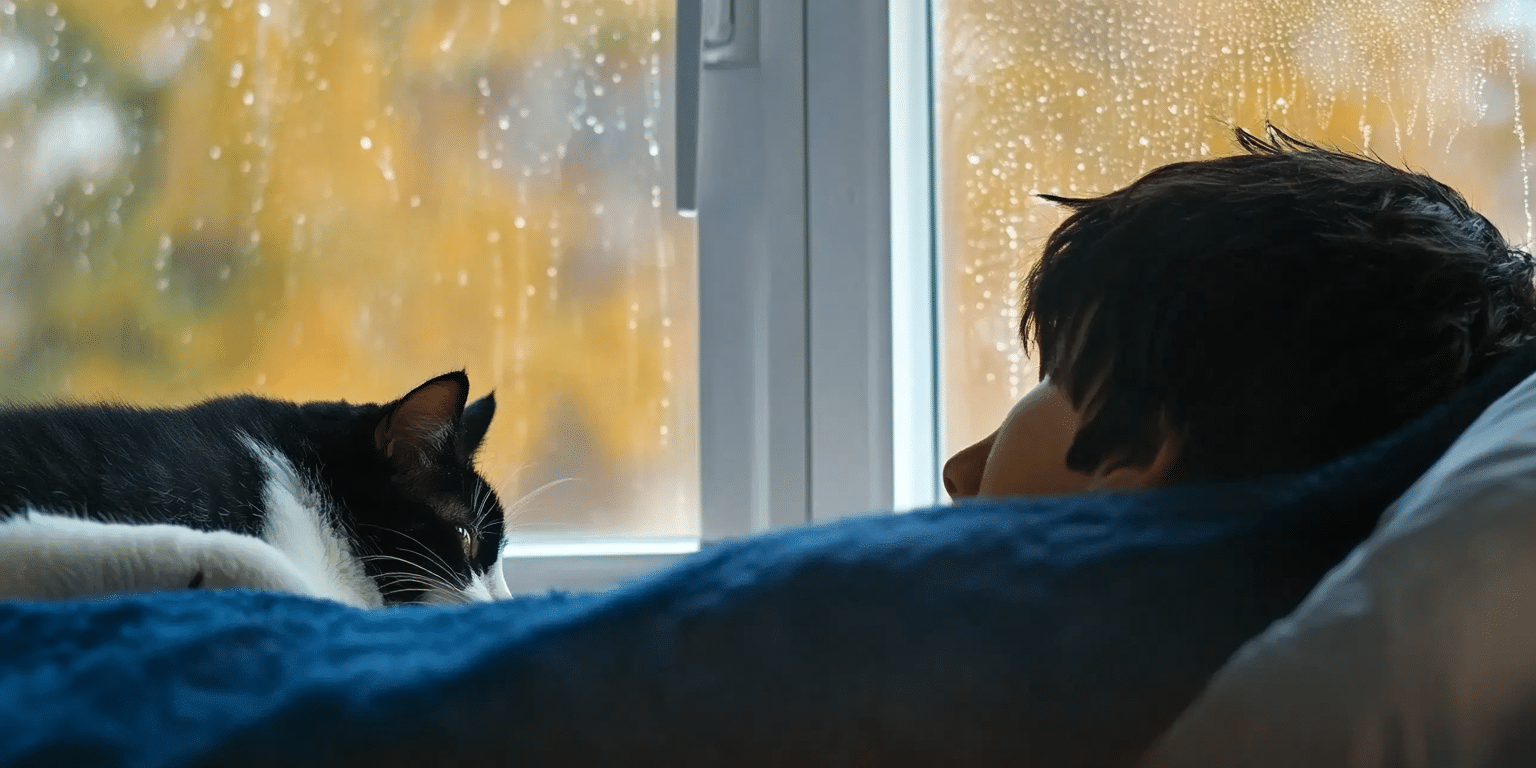Morning Anxiety: Start the Day Calm
Wake up with your heart already racing? You’re not alone. Many people feel their strongest worries right after the alarm rings, long before the first sip of coffee. This is often referred to as anxiety in the morning, a specific type of anxiety that can make starting the day especially challenging. In the next few minutes you’ll learn why that jolt shows up—and quick tweaks that can help you greet the day on steadier ground.
Note: Morning anxiety itself isn’t a formal diagnosis. This post is for educational purposes only. If the anxiety you feel on waking is affecting your well‑being, consider talking with a qualified mental‑health professional.
What Is Morning Anxiety
Morning anxiety means you wake up already in “fight‑or‑flight” mode—heart racing, thoughts spinning. While the term isn’t listed as a separate disorder in the DSM‑5, clinicians use it to describe anxiety that peaks right after waking. Common signs include racing thoughts, stomach churn, sweaty palms, or a sense of dread before you even check the time.
Knowing that morning anxiety is a pattern of symptoms, not its own diagnosis, lets you focus on the triggers you can change rather than worrying you have a brand‑new condition.
Understanding General Anxiety and Its Connection to Mornings
People who live with generalized anxiety disorder (GAD)—persistent, wide‑angle worry—often feel the tension most right after sunrise. One reason is biological: cortisol, the body’s main stress hormone, naturally surges 30–45 minutes after waking in what scientists call the cortisol awakening response .
For an already sensitive nervous system, that hormone spike can super‑charge anxious thoughts. Mix in low blood sugar from an overnight fast and a brain tallying unfinished tasks, and you’ve got a recipe for a dawn worry‑storm.
Why Does Morning Anxiety Feel Worse at Dawn?
1. The cortisol awakening response. Your body releases a natural burst of the stress hormone cortisol about 30–45 minutes after you wake up. This release is regulated by the body’s internal clock, which helps synchronize your sleep-wake cycle. For some people, that cortisol awakening response can feel like an internal alarm bell, revving up heart rate and tension. Early morning anxiety refers to the experience of waking up with feelings of worry, nervousness, or dread, often triggered by these biological changes. Morning anxiety typically affects individuals as they start their day and can worsen the longer they stay in bed.
2. Low blood sugar. If you ate dinner early or skipped a bedtime snack, your blood glucose may be low by morning. Low blood sugar can make you shaky and irritable—sensations that the brain may mislabel as danger. These blood sugar dips can also cause fluctuations in energy levels, making mornings feel even more challenging.
3. Sleep‑cycle hiccups. Fragmented sleep or too little REM can heighten amygdala activity, priming the brain for fear and worry. Not getting enough sleep can worsen morning anxiety, leaving you feeling more tired and stressed upon waking. Difficulties to fall asleep, often due to stress or anxiety, can contribute to this cycle. Poor or disrupted sleeping, including sleep disorders or insufficient rest, can negatively impact both mental and physical health, increasing the risk of early morning anxiety.
4. Racing thoughts about the day ahead. A long to‑do list, looming deadlines, or caregiving duties switch the mind into overdrive before your feet hit the floor (American Psychological Association). Morning anxiety can be exacerbated by anticipatory stress related to the day’s tasks or responsibilities.
Takeaway: Morning anxiety is often a perfect storm of biology (hormones, blood sugar), sleep quality, and unprocessed worries. Knowing these triggers makes them easier to tame.
Spotting Morning Anxiety Symptoms
Morning anxiety shows up in both body and mind. Common signs include:
- Physical cues: racing heartbeat, tight chest, upset stomach, tense muscles, sweaty palms. Morning anxiety can trigger the body’s fight or flight mode, which is a natural stress response that may lead to these physical symptoms.
- Mental cues: spiraling worry, “what‑if” thinking, irritability, feeling already “behind” before the day begins. Negative thoughts are also common, often fueling anxiety and making mornings feel overwhelming.
Other symptoms may also occur, such as trouble concentrating or changes in appetite, so it’s important to pay attention to the full range of experiences.
If these symptoms last more than a few weeks, intensify, or interfere with daily tasks, they may point to generalized anxiety disorder (GAD). A quick screening tool like the GAD‑7 can offer a snapshot, but only a licensed clinician can confirm a diagnosis.
Quick Calming Techniques for the First Hour
Small tweaks in your first sixty minutes can shift your nervous system from “alarm” to “okay, let’s go.”
Get out of bed as soon as you wake up. Taking this proactive step can help break the cycle of morning anxiety and set a positive tone for the day.
Try a two‑minute breathing reset. Sit up in bed and practice box breathing: inhale for four counts, hold for four, exhale for four, hold for four. Slow, even breaths tell your brain there’s no immediate danger.
Use the 3‑3‑3 grounding rule. Name three things you see, three sounds you hear, and move three parts of your body. This sensory scan yanks your focus out of the worry spiral and into the present moment.
Move—gently. Ten push‑ups, a few yoga stretches, or a brisk five‑minute walk signal to your body that cortisol’s job is done. Engaging in physical activity can release endorphins and help reduce anxiety.
Refuel wisely. Drink water and eat breakfast with protein and fiber (think Greek yogurt with fruit). Eating breakfast soon after waking helps regulate blood sugar and provides steady energy, which can stabilize your mood.
Watch the caffeine. Too much coffee can spike heart rate and jitters; aim for one cup or switch to green tea (Mayo Clinic). Limit caffeine, especially in the afternoon and evening, to help reduce morning anxiety and improve sleep quality.
Try positive affirmations. Use positive affirmations to challenge negative thoughts and promote a calm, confident mindset as you start your day.
Pro tip: Pair one calming habit with something you already do (breathe deeply while the coffee brews) to build consistency.
Designing a Stress‑Proof Morning Routine
Anxiety thrives on chaos. A predictable routine tells your nervous system, “We’ve got this.”
Get serious about sleep hygiene. A consistent bedtime, a cool dark room, and a screen‑free wind‑down cut next‑day anxiety risk.
Prep the night before. Spend five minutes laying out clothes, jotting a short to‑do list, and tidying your bedside table. Morning‑you will thank night‑you. If you feel anxious, consider reaching out to a trusted family member for support or encouragement as part of your routine.
Practice micro‑mindfulness. Before grabbing your phone, place a hand on your chest, name one thing you’re grateful for, and take one slow breath. The brain can’t sprint and savor at the same time. Practicing gratitude can shift thoughts from anxiety to positivity.
Add light, not alerts. Open curtains or step outside for natural light; it nudges your internal clock into “day mode” without doomscrolling.
Stick with these habits for two weeks and track how your mood shifts.
When to Seek Professional Help
DIY hacks can move the needle, but they aren’t always enough. Consider reaching out to a therapist if:
- Morning anxiety shows up most days for two weeks or more.
- Worry or panic makes it hard to work, study, or enjoy breakfast.
- Physical symptoms—like chest pain or shortness of breath—feel scary. If these symptoms suggest a medical emergency, such as severe chest pain or difficulty breathing, seek immediate medical attention or call emergency services.
- Self‑help strategies help only a little (or not at all).
A trained clinician can tailor evidence‑based treatments such as cognitive‑behavioral therapy (CBT), psychodynamic therapy, or mindfulness‑based approaches to your specific triggers. Some clients also benefit from medication—usually short‑term and prescribed by a medical provider—to smooth the path while therapy takes effect.
If you’re in the DC area, our team offers anxiety therapy in DC that blends these methods with compassionate, one‑on‑one support. For more information about different types of therapy for anxiety, visit our resource page. Outside of DC, you can search for providers through national groups like the Anxiety & Depression Association of America.
Closing Thoughts & Next Step
Morning anxiety can feel like waking to a built‑in alarm that isn’t on your side—but you’re not stuck with it. Understanding the biology behind the jitters, adding a few calming habits, and setting up a steadier morning routine can lower that baseline hum of worry. And when home strategies aren’t enough, professional support can help you reclaim your mornings.
Ready to start the day on calmer footing? Contact us to connect with a licensed therapist who understands morning anxiety and the people who live with it.
Frequently Asked Questions About Morning Anxiety
What are the common symptoms of morning anxiety?
Common symptoms of morning anxiety include racing thoughts, a racing heartbeat, tightness in the chest, stomach pain, restlessness, and excessive worry. People may also experience physical symptoms such as sweaty palms, muscle tension, and gastrointestinal distress. These symptoms often occur in the early morning and can make it difficult to start the day.
How can I relieve morning anxiety naturally?
To relieve morning anxiety, consider practicing mindfulness exercises and deep breathing techniques such as breathing exercises or box breathing. Establish a calming morning routine that includes physical activity and eating a balanced breakfast to stabilize blood sugar. Limiting caffeine intake and preparing for the day ahead the night before can also help reduce anxiety levels.
Is morning anxiety a sign of a mental health disorder?
Morning anxiety can be a symptom of mental health disorders like generalized anxiety disorder (GAD), but it can also occur independently due to factors like increased cortisol levels, sleep problems, or stress. If symptoms of morning anxiety persist and interfere with day-to-day life, it is advisable to consult a healthcare provider for evaluation and treatment options.
How does sleep affect morning anxiety?
Sleep disorders and trouble falling asleep can worsen morning anxiety by disrupting sleep quality and increasing stress hormone levels. Poor sleep hygiene and inconsistent sleep schedules can throw off the body’s internal clock, making anxiety worse in the morning. Improving sleep quality by maintaining a regular sleep schedule and addressing sleep problems can help manage morning anxiety.
When should I seek professional help for morning anxiety?
You should seek professional help if morning anxiety symptoms last for more than two weeks, interfere with daily life, or include severe physical symptoms like chest pain or shortness of breath. A healthcare provider can offer treatment options such as cognitive-behavioral therapy, medication, or support groups to help reduce symptoms and improve well-being.


